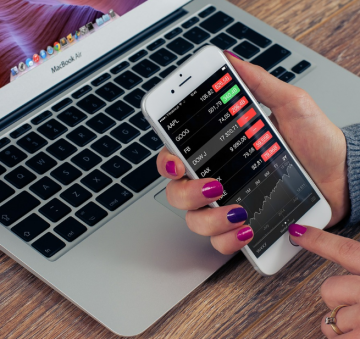Personal Tech for Women: 5 Things You Need to Know About Being More Screen-Free
Monday, June 22, 2015

1. Screen-Free Week
You may have missed the official international “Screen-Free Week” that happens annually in May. It’s an occasion when families, schools, and communities turn off digital entertainment and get back to the joys of the reality that happens outside the edges of the screen. For one whole week, TV, video games, apps and the web are replaced by books, board games, crafts and outdoor activities. But come on, who says we need to do this only in May? Try having a screen-free week any time it suits you or your family. Challenge yourself and make it longer, or try ditching not only screen-centric entertainment, but also laptops and smartphones too… of course, only if work allows it. Think about planning a screen-free week around a holiday – because if you’re already taking time off of work, then take time off from your devices too.
2. Look Up
It might sound contradictory to mention an app when trying to help one spend less time on screens, but this little bugger is promising to help you do just that. The Mac app Look Up is aiming to help you feel less robotic by reminding you to look away from your screen. It uses the 20-20-20 rule: every 20 minutes, for 20 seconds, look up from your screen and focus your gaze about 20 feet away. This mini-break is supposed to help with eyestrain, which can make even the freshest of faces look exhausted. On the 20-minute mark, a notification appears in your screen – you have the option of taking the break or dismissing it. Look Up also allows you to set small goals to accomplish by your next break. Simply type in a goal, and if you’ve completed it by the next 20 minutes, you can click the “I did it” button and set a new task. If might feel a bit like racing yourself, but if you’ve got a case of “the wandering mind” this might help you stay on track.
3. Decreasing smart phone time
Smartphones are addictive, says new research from the University of Derby, in the UK. The study shows how overusing a smartphone can impact one’s psychological well-being. And according to its numbers, the average user spent 3.6 hours per day on his or her smartphone, with 13% of participants classified as being addicted. Higher scores of narcissism were also linked to smartphone addiction. So to combat this, try the following: turn off your notifications, time your own smartphone use with an app (the results might scare you into using it less), don’t use your phone as an alarm clock, and give yourself daily breaks by putting your phone on Airplane Mode or out of reach – and hopefully out of mind.
4. Rescue Time
Okay, another app. But this one is not used for a short-term fix, like a quickie screen break. Rescue Time allows for a long-term break by showing you exactly how you use your time. As a desktop or smartphone app, it tracks the time you spend on applications and websites and gives you an accurate picture of your day; for instance, how much time was spent on email, on Skype calls, or taking sneaky Facebook breaks. This app is geared towards those who are computer-bound for work – and given the statistic at the top of this article – that’s a fair amount of us. It’s particularly great for freelancers too, whose “work hours” might be slightly blurry. By having that data, you’ll know exactly how, and where, you’re wasting your time. So streamline your workflow (like logging out of your personal email) and spend more time away from the screen.
5. Just turn it off
You can try an app like Self Control that lets you blacklist time-wasting websites, or a plug-in like LeechBlock which blocks sites during designated times of the day. Or just harness the willpower and turn off your computer when you’re not using it. If you’re busy going offline tasks, then power down the online device. It’ll stop you from getting distracting and rushing back to the screen because you need to know what day Christmas falls on – because you need to know now! No, you don’t. Take daily breaks from your screen too. When you grab a bite to eat, or when you need to do a squat or a yoga stretch for five minutes, turn it off. Take a walk during your break and leave your phone at home. And when you’re out for the night, turn off your phone when it’s in your purse or pocket. All the info, updates and notifications you need will still be there, later.

Related Slideshow: 10 Portland Tech Leaders on the Rise
Related Articles
- Personal Tech For Women: 5 Things You Need To Know About The Smart Garden
- Personal Tech for Women: 5 Things You Need To Know About Siren, a New Dating App for Women
- Personal Tech for Women: 5 Things You Need To Know About the “Smart Kitchen”
- Personal Tech for Women: 5 Things You Need To Know About Wearables
- Personal Tech For Women: 5 Things You Need to Know About “The Internet of Things”
- Personal Tech for Women: 5 Things You Need to Know About What Women Want in a Gadget
- Personal Tech for Women: 5 Things You Need to Know About Purging Your Closet
- Personal Tech For Women: 5 Things You Need To Know About Photo Editing With PDX App
- Personal Tech for Women: 5 Things You Need to Know About 3D Printing At Home
- Personal Tech For Women: 5 Things To Know About Tracking Your Stuff
- Personal Tech for Women: 5 Things You Need To Know About Apps For On-Demand Services in PDX
- Personal Tech for Women: 5 Things You Need To Know About Fitness Trackers
- Personal Tech For Women: 5 Things You Need to Know About New, Smarter Food Label
- Personal Tech for Women: 5 Things You Need to Know About Fun Gadgets for Spring
- Personal Tech for Women: 5 Things To Know About Technologies Designed Without Women in Mind
























Follow us on Pinterest Google + Facebook Twitter See It Read It